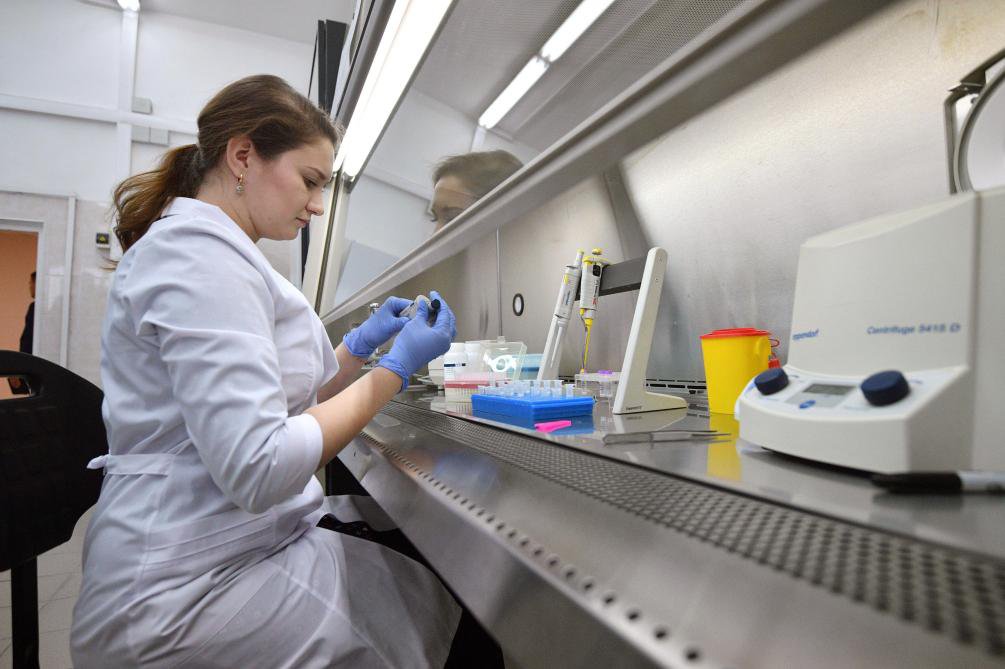Experts fear Russian scientists are risking another pandemic as they work to revive ancient viruses that wiped out mammoths.
Boffins at the former bioweapons lab in the Siberian city of Novosibirsk want to awaken infections that have been laying dormant for up to 400,000 years.

The “risky” research at the Vector State Research Centre of Virology and Biotechnology aims to understand how viruses evolve.
The Russian team are examining the remains of Ice Age animals such as mammoths and woolly rhinoceroses that used to roam the land.
This has raised the first red flag – as studying dead carcasses with dormant viruses is believed to be extremely dangerous, as it’s possible the disease could spread to living animals.
The creatures’ corpses were almost perfectly preserved by the sub-zero temperatures in the region of Yakutia, where the mercury can plummet to a bone-chilling -55C.
It is the same place where French scientists recently revived a “zombie virus” that was trapped under a frozen lake for 50,000 years.
Medical boffins from Aix-Marseille University uncovered what is believed to be the oldest “live” virus in November – suggesting Vector are now trying to give them a run for their money.
Russian researchers also hope to identify archaic viruses – also known as paleoviruses – trapped in Ice Age animals and revive them.
But experts have raised concerns regarding Vector’s research amid a string of catastrophic blunders at the maximum-security lab.
A series of bizarre incidents – that have left people injured, and even one dead – have plagued the facility over the last two decades.
Boffins across the globe fear any similar slip-ups while the new research is taking place could trigger another catastrophic pandemic.
One warned that the pre-historic viruses Russia are playing around with that obliterated Ice Age animals would be able to infect humans.
Despite being inspected by the World Health Organisation every two years in line with all high-security disease labs, there is a lack of confidence in Vector’s vigilance.
Professor Jean-Michel Claverie, from the National Centre of Scientific Research at the University of Aix-Marseille, told The Times: “The Vector research is very, very risky.
“Our immune systems have never encountered these type of viruses. Some of them could be 200,000 or even 400,000 years old.
“I would not be very confident that everything is up to date.”
The idea of them escaping the former Soviet biological weapons laboratory isn’t too far-fetched either, following a similar scare in 2019.
A gas explosion and ensuing fire ripped through Vector – where the world’s most infectious viruses are stored – in September 2019.
Highly lethal diseases including the Bubonic Plague, Anthrax and Ebola are stashed at the research centre.
It is also one of just two places in the world to stockpile smallpox.
A worker was left with third-degree burns from the blast, which caused windows at the heavily guarded facility to shatter.
Despite the presumed risk to the public and fears of biological contamination, the lab “downplayed” concerns.
Vector insisted “no work with biological materials was going on” prior to the powerful blaze.
It came after another harrowing incident back in May 2004, where a researcher died after accidently pricking herself with a needle containing the Ebola virus.
Antonina Presnyakova, 46, was working on a vaccine for the disease when the needle pierced through two layers of gloves.
Eyebrows were raised after Vector only reported the deadly debacle to the World Health Organisation weeks later.
However, the WHO found no significant concerns during their most recent inspection of the facility in 2019..
But they were unable to scrutinize scientists conducting practical work, as Vector was closed for “scheduled maintenance.”
The former bioweapons lab’s sketchy reputation has only amped up concerns regarding their new research, which began last year.
Communication between western and Russian scientists has dried up following Vladimir Putin’s invasion of Ukraine in February.
And as the world continues to overcome the ordeal of Covid, many believe ancient viruses are best left alone.
Biosecurity expert at King’s College London, Filippa Lentzos, explained even the most secure facilities can be breached.
She said: “Many of us who are analysing and following what they’re doing aren’t convinced that the potential benefits, which are in the far distant future, are necessarily outweighing the very real risks that are in the present.
“Even with generally safe practises, accidents can still happen.”
Vector was set up in 1974 as a closed institute researching vaccines and “defences against bacteriological and biological weapons”.
In Soviet times, the lab was known for its interest in biological warfare.
Vector was set up in 1974 as a closed institute researching vaccines and “defences against bacteriological and biological weapons”.
In Soviet times, the lab was known for its interest in biological warfare.